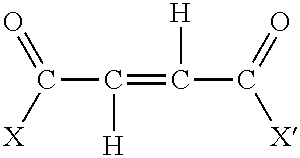Process for the preparation of polyalkenyl succinic anhydrides
a technology of succinic anhydride and polyalkenyl succinyl, which is applied in the field of chemical synthesis of polyalkenyl succinic anhydrides, can solve the problems of sedimentous resin formation, adversely affecting the detergency properties of such additives, and not only a significant discrepancy between real and apparent succinylation
- Summary
- Abstract
- Description
- Claims
- Application Information
AI Technical Summary
Benefits of technology
Problems solved by technology
Method used
Image
Examples
examples
[0028]The following non-limiting examples comparatively illustrate one or more advantages of the presently disclosed process over conventional processes in the production of PIBSA having a high SA to PIB ratio. In the following examples, Examples 3 and 5 are made according to the two step process described herein and provide PIBSA products from HR-PIB having a relatively high SA to PIB ratio in relatively high yield. Examples 1 and 6 illustrate products made using non-highly reactive PIB (non-HR-PIB). Examples 2 and 4 were made by a one-step thermal ene reaction using HR-PIB.
[0029]
PIBPIBSA ProductExample #PIBMnAcid #ActivitySA:PIB1non-HR-PIB12500.67268.1%1.372HR-PIB12500.94688.1%1.53HR-PIB13001.07092.0%1.84HR-PIB21000.55280.1%1.55HR-PIB21000.73291.5%1.86non-HR-PIB21000.62189.1%1.6
[0030]In the first example, a conventional (i.e. non-highly reactive) PIB having a number average molecular weight of about 1250 was reacted using the presently disclosed two stage process for the productio...
PUM
| Property | Measurement | Unit |
|---|---|---|
| temperature | aaaaa | aaaaa |
| temperatures | aaaaa | aaaaa |
| weight % | aaaaa | aaaaa |
Abstract
Description
Claims
Application Information
 Login to View More
Login to View More - R&D
- Intellectual Property
- Life Sciences
- Materials
- Tech Scout
- Unparalleled Data Quality
- Higher Quality Content
- 60% Fewer Hallucinations
Browse by: Latest US Patents, China's latest patents, Technical Efficacy Thesaurus, Application Domain, Technology Topic, Popular Technical Reports.
© 2025 PatSnap. All rights reserved.Legal|Privacy policy|Modern Slavery Act Transparency Statement|Sitemap|About US| Contact US: help@patsnap.com

